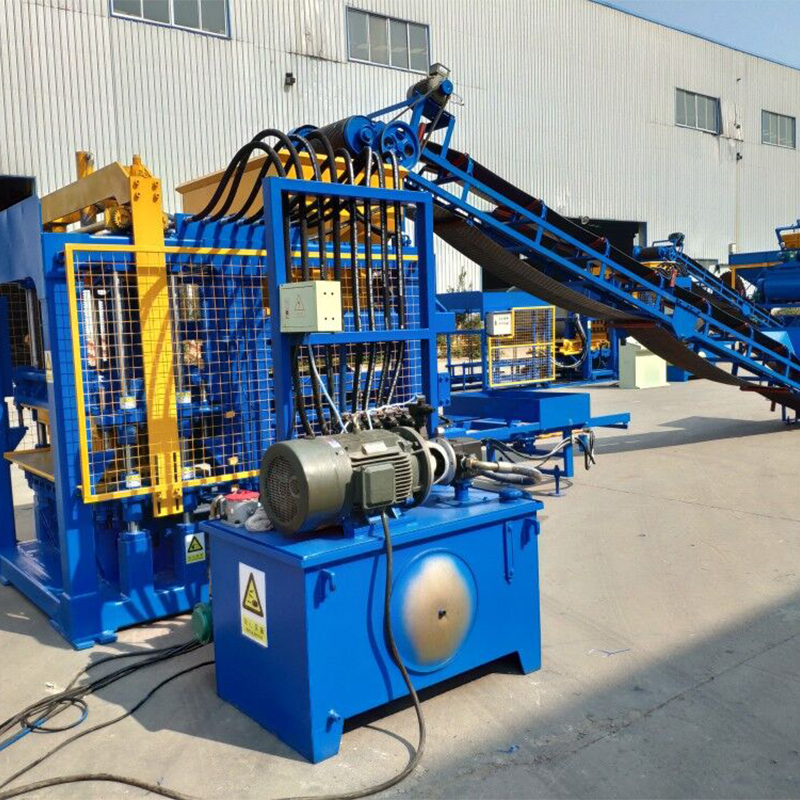
Image source Aiweibrickmachine
Market Opportunities for Full-Automatic Block Products in Developing Economies.
Title: Seizing Growth: Market Opportunities for Full-Automatic Block Products in Developing Economies
Introduction
As developing economies experience rapid urbanization and infrastructure expansion, the demand for efficient and cost-effective building materials is escalating. Full-automatic block products, characterized by precision, speed, and versatility, are well-positioned to capitalize on the burgeoning construction needs of these dynamic markets. This article explores the significant market opportunities for full-automatic block products in developing economies, emphasizing the role they play in addressing key challenges and driving sustainable development.
1. **Rapid Urbanization and Infrastructure Development**
Developing economies are undergoing unprecedented urbanization, with a surge in population density in urban areas. This urban growth necessitates extensive infrastructure development, including residential buildings, commercial spaces, and public facilities. Full-automatic block products, with their ability to streamline construction processes and meet high production demands, become essential components in the rapid development of infrastructure projects in these economies.
2. **Affordable Housing Initiatives**
Many developing economies face the challenge of providing affordable housing for their growing populations. Full-automatic block products, known for their efficiency and cost-effectiveness, align with the objectives of affordable housing initiatives. By optimizing production processes and minimizing material waste, these products contribute to the affordability of construction projects, making them an attractive choice for government-led housing programs and private developers.
3. **Quality and Consistency in Construction**
Ensuring the quality and consistency of construction materials is a critical concern in developing economies. Full-automatic block production guarantees precision and uniformity in block manufacturing. This reliability is especially beneficial in regions where traditional construction methods may be prone to variations in material quality. Builders and contractors in these economies are increasingly turning to full-automatic block products to meet stringent quality standards and enhance the durability of structures.
4. **Energy Efficiency and Environmental Sustainability**
Sustainability is gaining prominence in global construction practices, and developing economies are no exception. Full-automatic block products can contribute to energy efficiency and environmental sustainability. By incorporating eco-friendly materials, optimizing energy consumption, and minimizing waste, these products align with the growing demand for sustainable construction solutions. Manufacturers can leverage this market trend by promoting the environmental benefits of full-automatic block products.
5. **Modular Construction for Speed and Scalability**
Modular construction, enabled by full-automatic block products, offers a solution to the time-sensitive nature of construction projects in developing economies. The speed and scalability of full-automatic block production lines make them ideal for producing modular components. This approach accelerates construction timelines, reduces labor costs, and addresses the urgent need for rapid project completion in the face of increasing urbanization and population growth.
6. **Technology Transfer and Local Manufacturing**
The adoption of full-automatic block products in developing economies presents an opportunity for technology transfer and local manufacturing. International manufacturers can collaborate with local partners to establish production facilities, transferring knowledge and expertise in full-automatic block manufacturing. This collaboration not only addresses the demand for advanced building materials but also fosters economic growth by creating local job opportunities and supporting skill development.
7. **Customization for Local Building Practices**
Full-automatic block products can be customized to align with local building practices and architectural preferences. This adaptability is crucial in developing economies with diverse construction methods and cultural nuances. Manufacturers can tailor their products to meet specific design requirements, ensuring that full-automatic block solutions seamlessly integrate with the local built environment.
8. **Government Initiatives and Incentives**
Government initiatives and incentives play a pivotal role in shaping the market landscape in developing economies. Policies promoting sustainable construction practices, affordable housing, and infrastructure development create a conducive environment for the adoption of full-automatic block products. Manufacturers can capitalize on these initiatives by aligning their products with government priorities and participating in collaborative efforts to drive industry growth.
Conclusion
The market opportunities for full-automatic block products in developing economies are vast and dynamic. As these economies undergo transformative changes in urbanization, construction needs, and sustainability expectations, full-automatic block manufacturers have the chance to play a central role in shaping the built environment. By addressing the demands for efficiency, affordability, and sustainability, full-automatic block products can contribute significantly to the advancement of construction practices in developing economies, fostering economic growth and improving living standards.
